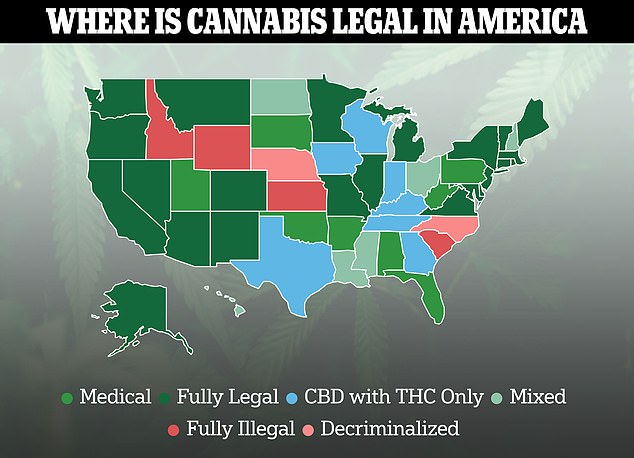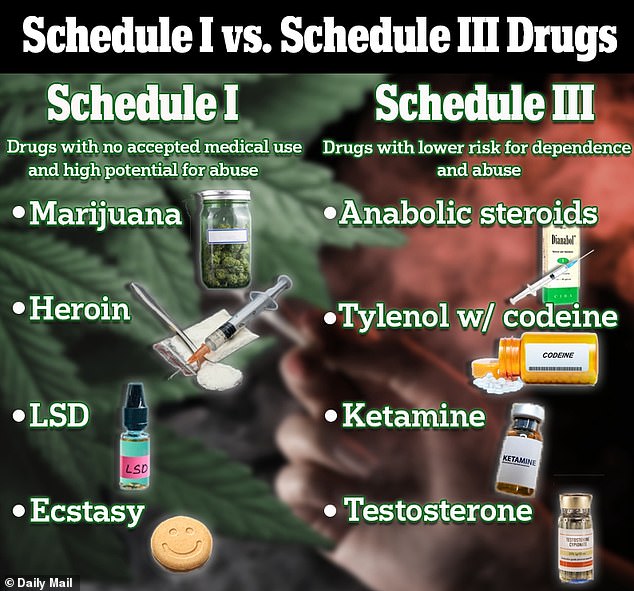Stress on the body: Marijuana increases the risk of heart attack, heart failure and stroke by up to a THIRD, two major studies show
Regular marijuana use is ‘strongly’ linked to heart failure and stroke, two major studies suggest.
A study that followed 160,000 adults over the age of 54 for four years found that those who smoked marijuana daily had a 34 percent higher risk of heart failure.
And within a second, researchers found that hospitalized people over the age of 65 who had used marijuana — but not cigarettes — were 20 percent more likely to have a serious heart attack or stroke.
Researchers warned that data “strongly indicated” that “cannabis use at any time, whether recreational or medicinal,” was not without risks.
Amid the wave of cannabis legalizations in the US, experts say the jury is no longer out on whether cannabis is bad for your heart. Further studies have also warned that this increases the risk of schizophrenia and mental health problems.
Researchers warned that data ‘strongly indicated’ that ‘cannabis use at any time, whether recreational or medicinal’, was not without risks (Stock Image)

The map above shows the states that have and have not legalized cannabis for use
Dr. Robert Page II, a cardiologist at the American Heart Association (AHA) who led one of the studies, told CNN that cannabis “can lead to… cardiovascular disease.”
Although tar is most commonly associated with cigarettes, Dr Page said: ‘The latest research into cannabis use suggests that smoking and inhaling cannabis increases blood concentrations of carboxyhemoglobin (or carbon monoxide, a poisonous gas) and tar.
“(This has) similar effects to inhaling a tobacco cigarette, both of which have been linked to heart muscle disease, chest pain, arrhythmias, heart attacks and other serious conditions.”
Tar in the blood can cause blood vessels to thicken and narrow, raising blood pressure and increasing the risk of heart problems.
Carbon monoxide can also bind to hemoglobin in red blood cells, reducing the amount of oxygen they can carry, which also increases the risk of heart problems.
There are also concerns about edible marijuana products, which often contain much more THC – the active ingredient in cannabis – than the smoked versions.
There are warnings that these can cause the heart to beat faster and blood pressure to rise, which can be dangerous, especially in people with heart disease.
Older people may also be at greater risk because they have slower metabolisms, meaning cannabis can linger in the body longer, prolonging its effects.
The warning comes as older adults become more likely to use marijuana. A 2020 study found that the number of marijuana users in this age group – smoking or using edibles – doubled to 2.3 million people between 2015 and 2018.
Research shows that almost three in ten develop a dependency, called cannabis use disorder, when they have no appetite, or become irritable or restless when not using cannabis.
Doctors are now suggesting that older patients should be asked if they use cannabis recreationally before receiving treatment.
The AHA advises people not to smoke or vape any substance, including cannabis, due to the risks to heart health.
The investigations are to present during the American Heart Association’s Scientific Sessions 2023, which will take place this weekend in Philadelphia, Pennsylvania.
In the first paper, researchers looked at data from nearly 160,000 adults in the All of US Research Program – a National Institutes of Health-backed program that tracks the medical histories of at least a million people in the US.
Researchers defined participants as marijuana users if they used the drug recreationally or, if they were given it for medicinal purposes, used it more often than prescribed by their doctor.
They were followed for four years, from June 2016 to the end of June 2022.
The results showed that 2,958 participants developed heart failure during the study period.
After adjusting for factors such as alcohol use, smoking and type 2 diabetes, researchers found that those who reported daily marijuana use had a higher risk of heart failure compared to those who said they had never used it.

The Biden administration’s Department of Health and Human Services (HHS) has asked the Drug Enforcement Administration (DEA) to downgrade cannabis from a Schedule I substance to a Schedule III substance
Dr. Yakubu Bene-Alhasan, a physician at Medstar Health in Baltimore, Maryland, who led the study, said: ‘Previous research shows links between marijuana use and cardiovascular diseases such as coronary artery disease, heart failure and atrial fibrillation, which are known to cause heart failure. .
“Our results should encourage more researchers to study marijuana use to better understand its health consequences, especially regarding cardiovascular risk.”
For this study, researchers did not ask patients to indicate whether they smoked marijuana or consumed edibles.
In the second study, researchers pulled data from the 2019 National Inpatient Sample – the largest national database of hospital admissions.
Researchers analyzed data on adults over 65 with cardiovascular risk factors – such as obesity and type 2 diabetes – and then divided them into two groups: those who had used marijuana and those who had not. Patients who admitted to smoking cigarettes were excluded.
The study included 28,535 patients who had used cannabis with pre-existing risk factors for heart disease and 10 million patients with these risk factors but not using marijuana.
The results showed that those who used marijuana had a 20 percent higher risk of serious heart or brain disease during their hospitalization, compared to those who did not.
They also had a higher risk of heart attacks and were more likely to be transferred to other facilities.
Dr. Avilash Mondal, a physician at Nazareth Hospital in Philadelphia who led the study, said: ‘Since 2015, cannabis use in the US has almost doubled and is increasing among older adults.
‘Therefore, it is important to understand the potential increased cardiovascular risk of cannabis use.
‘Healthcare professionals should answer the question ‘Do you use cannabis?’ include when taking a patient’s history.
“When you ask patients if they smoke, people think about smoking cigarettes.” The key public message is to be more aware of the increased risks and open the lines of communication so that cannabis use is recognized and considered.”
